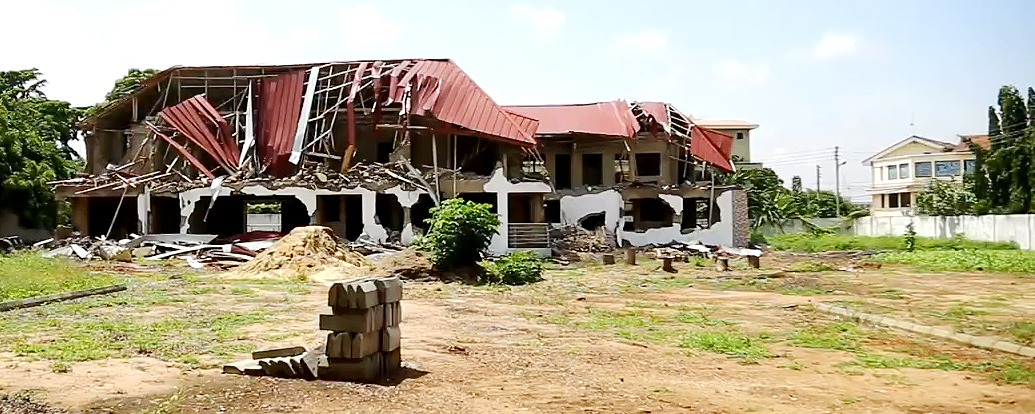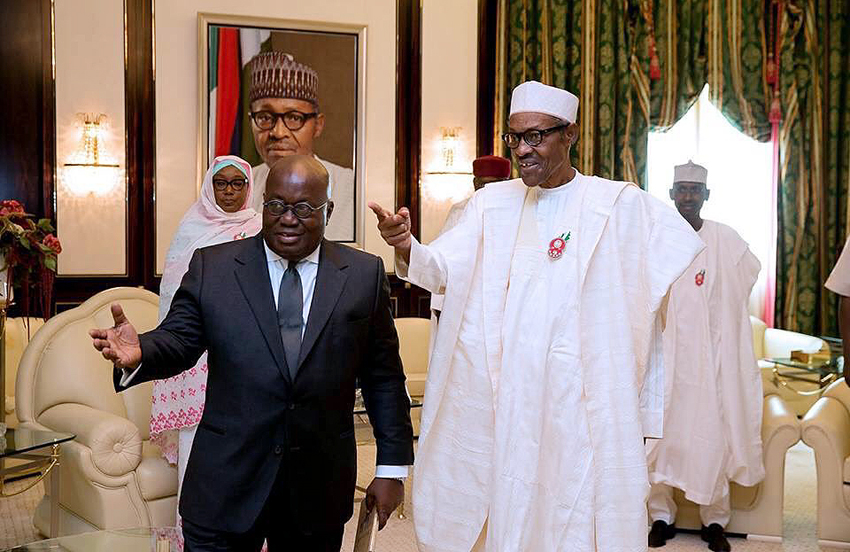Nigeria has criticised what it calls the “incessant harassment of its citizens in Ghana and the progressive acts of hostility towards the country by Ghanaian authorities”.
“The Nigerian Government is deeply concerned by the incessant harassment of its citizens in Ghana and the progressive acts of hostility towards the country by Ghanaian authorities, and will no longer tolerate such,” Nigeria’s Minister of Information, Lai Mohammed, said in a statement he issued in Abuja on Friday.
Mohammed said Nigeria was “urgently considering a number of options” to deal with the situation, a veiled threat to take retaliatory actions.
He lists a number of issues, which Abuja considers “acts of hostility towards Nigeria and Nigerians by the Ghanaian authorities” including:
– Seizure of the Nigerian Mission’s property located at No. 10, Barnes Road, Accra, which the Nigerian Government has used as diplomatic premises for almost 50 years. This action is a serious breach of the Vienna Convention.
– Demolition of the Nigerian Mission’s property located at No. 19/21 Julius Nyerere Street, East Ridge, Accra, another serious breach of the Vienna Convention.
– Aggressive and incessant deportation of Nigerians from Ghana. Between January 2018 and February 2019, 825 Nigerians were deported from Ghana.
– Closure of shops belonging to Nigerians. Over 300 Nigerians shops were locked for four months in Kumasi in 2018; over 600 Nigerian shops were locked in 2019 and, currently, over 250 Nigerians shops have been locked.

– Residency Permit requirements, for which the Ghana Immigration Service has placed huge fees, far higher than the fees charged by the Nigerian Immigration Service. These include the compulsory Non-citizen ID card (US$120, and US$60 for yearly renewal); Medical examinations, including for Covid-19 which is newly-introduced (about US$120), and payment for residency permit (US$400 compared to the N7,000 being paid by Ghanaians for residency card in Nigeria)
– Outrageous stipulations in the Ghana Investment Promotion Centre Act. When the Act was initially promulgated in 1994, a foreigner is required to invest at least US$300,000 by way of equity capital and also employ 10 Ghanaians. This Act has now been amended twice, with the 2018 GIPC Act raising the minimum capital base for foreign-owned businesses to US$1m. Though targeted at foreigners, it seems GIPC’s definition of foreigners is Nigerians. The GIPC Act also negates the ECOWAS Protocol.
– Media war against Nigerians in Ghana. The negative reportage of issues concerning Nigerians resident in Ghana by the Ghanaian media is fuelling an emerging xenophobic attitude towards Nigerian traders and Nigerians in general. The immediate fallout is the incessant harassment and arrest of Nigerian traders and closure of their shops.

– Harsh and openly-biased judicial trial and pronouncement of indiscriminately-long jail terms for convicted Nigerians. There are currently over 200 Nigerians in the Nsawam Maximum prison in Ghana alone.
READ ALSO Media mogul criticises Ghana over harassment of Nigerian traders
The minister said there were over 1 million Ghanaians resident in Nigeria and “they are not being subjected to the kind of hostility being meted out to Nigerians in Ghana”.
“Nigeria has time after time demonstrated its fidelity to the long cordial relations with Ghana. But indications, especially in recent times, are that Nigeria’s stance is now being taken for granted and its citizens being made targets of harassment and objects of ridicule,” the statement added.
“This will no longer be tolerated under any guise.”
Nigerian traders in Ghana have been complaining of harassment for several years with their business premises or shops frequently closed down by the authorities ostensibly for reasons ranging from operating in Ghana illegally to their not satisfying the condition for non-citizen engagement in specific business activities such as retail trading, which requires non-Ghanaians to invest US$1 million.
Ghanaian law bars foreigners from engaging in the retail business, especially in market areas and local business owners are putting pressure on the authorities to enforce the law.
Kola Tella
READ ALSO Opinion: Nigerian traders and Ghana’s hypocrisy on African free trade
 THE AFRICAN COURIER. Reporting Africa and its Diaspora! The African Courier is an international magazine published in Germany to report on Africa and the Diaspora African experience. The first issue of the bimonthly magazine appeared on the newsstands on 15 February 1998. The African Courier is a communication forum for European-African political, economic and cultural exchanges, and a voice for Africa in Europe.
THE AFRICAN COURIER. Reporting Africa and its Diaspora! The African Courier is an international magazine published in Germany to report on Africa and the Diaspora African experience. The first issue of the bimonthly magazine appeared on the newsstands on 15 February 1998. The African Courier is a communication forum for European-African political, economic and cultural exchanges, and a voice for Africa in Europe.




























